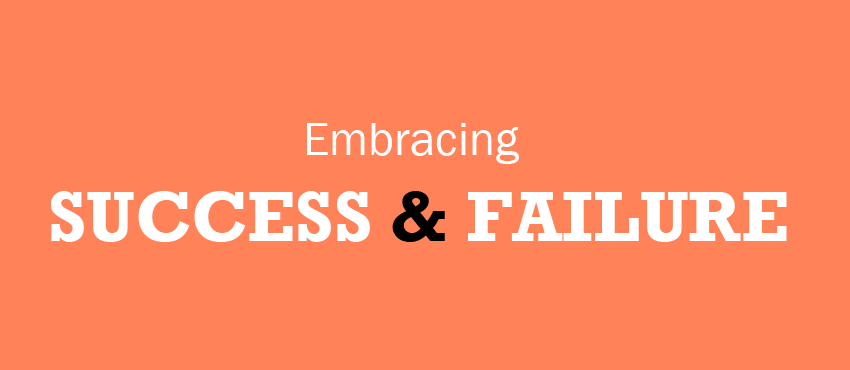Nobody likes failing. Even the world’s most ambitious entrepreneurs don’t like failing; they do embrace failures, but successes still taste better. But how can they embrace failure?

One answer: They know they have a good chance of failing; they prepare for failing. Entrepreneurship is all about failing over and over again until you find success. Entrepreneurship is all about failing enough times so that you can be successful.
Another answer: They know that when they fail, they are one step closer to their goals. So, the faster they fail, the faster they will reach the goals. “Fail fast” is the mantra.
Sounds painful: How to make failure less painful?
I don’t like failure; but I know that, just like success, it’s a part of entrepreneurship. It’s just the way it is – if you don’t want to fail, then don’t jump onto the entrepreneurship bandwagon. It’s not for the faint-hearted.
In teaching myself on how to embrace failure, I always seek ways to make failures less painful via proper preparation.
I don’t fancy lengthy planning before I start something up, but I do have some analysis which allows me to identify the pros and cons of the ideas I am pursuing. Knowing the good, bad and ugly of a startup allows you and me to be mentally prepared – just in case something bad is happening.
So, how can I minimize collateral damages caused by my failures? In my case, I adopt the principles of kaizen to help me embrace failures well, as well as following the 10,000 hours rule as a guide.
Here’s a good explanation on what Kaizen is:
Malcolm Gladwell coins the 10,000 hours rule. The rule says that it takes someone 10,000 hours before he/she achieves the status of “Expert.” Many are being skeptical about this rule, but I embrace it, in a sense that it gives me guidelines to evaluate my efforts.
10,000 hours – in my case, that’s more than 5 years or doing what I am doing. I never consider myself as an expert, but I know I am an “expert” in web business building – thanks to the failures I have experienced. My trial and error is countless, and I am fortunate I fail a lot; I find success faster.
I have built hundreds of websites, which 90% of them are failing. Yes, I lose money along the way, but what I generate with the successful websites is way much more than the money I lost.
So, what am I doing during those 10,000 hours – and counting? I keep on finding better ways to manage my risks of failure. I also keep on finding better ways to fail fast; quickly identifying the failing startup projects, and quickly move on to the next project. I am continuously improving myself.
Well, you can accelerate yourself to go faster than that – however, you do need to continuously challenge yourself to the limit, the Tim Ferris way.
And yes, the key in becoming an expert is to never sit back and relax; to never allow yourself to establish a comfort zone; to continuously challenge yourself so you don’t catch yourself off-guard.
Entrepreneurship is pretty much like fire walk or bungee jumping: You need to get out of your comfort zone, challenge yourself, overcome fear and take action.
Want a role model? Try Sir Richard Branson. Unique, creative, a bit eccentric – but fun to follow and learn from. Virgin Galactic, anyone?
Takeaway
Want to overcome your fear of failure but still have no idea on how to get started? I personally suggest you to take someone successful as a mentor.
If you can have sessions with the mentor, then it’s great; but if you can’t, follow their stories, tips and advice can help you to be a better risk taker.
I personally don’t have a personal mentor, but I do have many “mentors” I closely follow – some of them are Tim Ferriss (the 4-hour-everything guy,) Robert Kiyosaki (Rich Dad Poor Dad,) Sir Richard Branson (the owner of everything Virgin,) and so on.
At a glance, here’s an interview with Robert Kiyosaki to learn about his mindset:
As you can see, the mentors I follow are “different” than typical experts. They have personality, uniqueness and a knack of doing something against the mainstream.
I personally suggest you to find out a bit about them and their works – then you’ll start to see that failures are not all that bad; they are in fact good for your health and well-being!
So, are you ready to failing?



